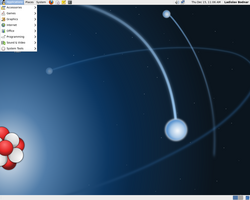
A Linux distribution is an operating system made from a software collection that includes the Linux kernel, and often a package management system. Linux users usually obtain their operating system by downloading one of the Linux distributions, which are available for a wide variety of systems ranging from embedded devices and personal computers to powerful supercomputers.
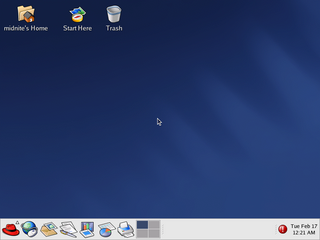
Red Hat Linux was a widely used commercial open-source Linux distribution created by Red Hat until its discontinuation in 2004.
Sorcerer was a source-based Linux distribution. The distribution downloads and compiles source code to install and update installed software.

Fermi National Accelerator Laboratory (Fermilab), located just outside Batavia, Illinois, near Chicago, is a United States Department of Energy national laboratory specializing in high-energy particle physics. Since 2007, Fermilab has been operated by the Fermi Research Alliance (FRA), a joint venture of the University of Chicago, and the Universities Research Association (URA); although in 2023, the Department of Energy (DOE) opened bidding for a new contractor due to concerns about the FRA performance. Fermilab is a part of the Illinois Technology and Research Corridor.
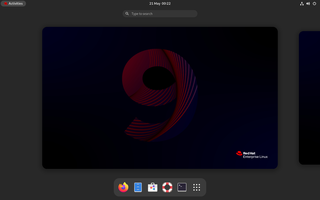
Red Hat Enterprise Linux (RHEL) is a commercial Linux distribution developed by Red Hat for the commercial market. Red Hat Enterprise Linux is released in server versions for x86-64, Power ISA, ARM64, and IBM Z and a desktop version for x86-64. Fedora Linux and CentOS Stream serves as its upstream source. All of Red Hat's official support and training, together with the Red Hat Certification Program, focuses on the Red Hat Enterprise Linux platform.

CentOS is a discontinued Linux distribution that provided a free and open-source community-supported computing platform, functionally compatible with its upstream source, Red Hat Enterprise Linux (RHEL). In January 2014, CentOS announced the official joining with Red Hat while staying independent from RHEL, under a new CentOS governing board.
Wind River Systems, also known as Wind River, is an Alameda, California–based company, subsidiary of Aptiv PLC. The company develops embedded system and cloud software consisting of real-time operating systems software, industry-specific software, simulation technology, development tools and middleware.
Technical variations of Linux distributions include support for different hardware devices and systems or software package configurations. Organizational differences may be motivated by historical reasons. Other criteria include security, including how quickly security upgrades are available; ease of package management; and number of packages available.

Scientific Linux (SL) is a discontinued Linux distribution produced by Fermilab, CERN, DESY and by ETH Zurich. It is a free and open-source operating system based on Red Hat Enterprise Linux.

Red Hat Enterprise Linux derivatives are Linux distributions that are based on the source code of Red Hat Enterprise Linux (RHEL).
BioLinux is a term used in a variety of projects involved in making access to bioinformatics software on a Linux platform easier using one or more of the following methods:
OpenJDK is a free and open-source implementation of the Java Platform, Standard Edition. It is the result of an effort Sun Microsystems began in 2006. The implementation is licensed under the GPL-2.0-only with a linking exception. Were it not for the GPL linking exception, components that linked to the Java Class Library would be subject to the terms of the GPL license. OpenJDK is the official reference implementation of Java SE since version 7.
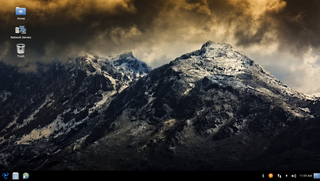
Trisquel is a computer operating system, a Linux distribution, derived from another distribution, Ubuntu. The project aims for a fully free software system without proprietary software or firmware and uses a version of Ubuntu's modified kernel, with the non-free code removed. Trisquel relies on user donations. Its logo is a triskelion, a Celtic symbol. Trisquel is listed by the Free Software Foundation as a distribution that contains only free software.
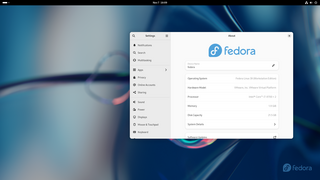
Fedora Linux is a Linux distribution developed by the Fedora Project. It was originally developed in 2003 as a continuation of the Red Hat Linux project. It contains software distributed under various free and open-source licenses and aims to be on the leading edge of open-source technologies. It is now the upstream source for CentOS Stream and Red Hat Enterprise Linux.
IcedTea is a build and integration project for OpenJDK launched by Red Hat in June 2007. IcedTea also includes some addon libraries: IcedTea-Web is a free software implementation of Java Web Start and the Java web browser applet plugin. IcedTea-Sound is a collection of plugins for the Java sound subsystem, including the PulseAudio provider which used to be included with IcedTea. The Free Software Foundation recommends that all Java programmers use IcedTea as their development environment.

RPM Package Manager (RPM) is a free and open-source package management system. The name RPM refers to the .rpm file format and the package manager program itself. RPM was intended primarily for Linux distributions; the file format is the baseline package format of the Linux Standard Base.

Rocky Linux is a Linux distribution developed by Rocky Enterprise Software Foundation, which is a privately owned benefit corporation that describes itself as a "self-imposed not-for-profit". It is intended to be a downstream, complete binary-compatible release using the Red Hat Enterprise Linux (RHEL) operating system source code. The project's aim is to provide a community-supported, production-grade enterprise operating system. Rocky Linux, along with RHEL and SUSE Linux Enterprise (SLE), has become popular for enterprise operating system use.
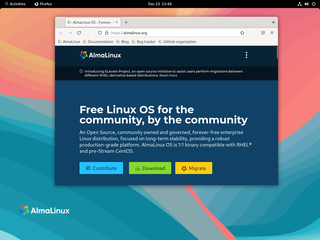
AlmaLinux is a free and open source Linux distribution, developed by the AlmaLinux OS Foundation, a 501(c) organization, to provide a community-supported, production-grade enterprise operating system that is binary-compatible with Red Hat Enterprise Linux (RHEL). The name of the distribution comes from the word "alma", meaning "soul" in Spanish and other Latin languages. It was chosen to be a homage to the Linux community.

